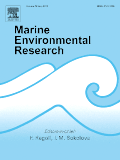
MARINE ENVIRONMENTAL RESEARCH
Scope & Guideline
Advancing Knowledge for Ocean Conservation
Introduction
Aims and Scopes
- Marine Ecosystem Health and Biodiversity:
Research on the status, health, and biodiversity of marine ecosystems, including assessments of species richness, abundance, and community dynamics. - Pollution and Contamination Studies:
Investigations into the sources, impacts, and bioremediation of pollutants, including microplastics, heavy metals, and pharmaceuticals on marine organisms. - Climate Change Impacts:
Studies examining how climate-related changes, such as ocean warming and acidification, affect marine species, community structures, and ecosystem services. - Ecosystem Services and Management:
Research focused on the ecosystem services provided by marine environments, including fisheries, carbon sequestration, and habitat restoration, and how these can be managed sustainably. - Interactions of Marine Organisms with Environmental Stressors:
Exploration of how marine organisms respond to various environmental stressors, including temperature fluctuations, hypoxia, and salinity changes. - Benthic and Pelagic Interactions:
Studies on the interactions between benthic and pelagic organisms and their roles in nutrient cycling and energy transfer within marine ecosystems.
Trending and Emerging
- Microplastics and Marine Pollution:
An increasing number of studies focus on the prevalence, impacts, and mitigation strategies for microplastics in marine environments, reflecting growing public and scientific concern. - Climate Change Adaptation Strategies:
Research is trending towards identifying adaptive strategies for marine species and ecosystems in response to climate change, including resilience mechanisms and management practices. - Ecosystem-Based Management Approaches:
A shift towards ecosystem-based management frameworks that consider the interdependencies of marine species and their habitats is emerging, highlighting the need for integrated management strategies. - Technological Innovations in Marine Research:
The use of advanced technologies, such as remote sensing, eDNA analysis, and machine learning for biodiversity assessments and monitoring environmental changes, is on the rise. - Human-Marine Ecosystem Interactions:
Studies examining the socio-economic dimensions of marine ecosystems, including the impacts of tourism, aquaculture, and coastal development on marine health and biodiversity, are gaining traction.
Declining or Waning
- Traditional Fisheries Research:
Research specifically focused on traditional fisheries management has decreased as attention shifts towards integrated ecosystem-based approaches and the impacts of climate change on marine populations. - Historical Baseline Studies:
The emphasis on historical data comparison and baseline studies has waned, likely due to a growing focus on real-time monitoring and adaptive management strategies. - Single Species Impact Studies:
Research concentrating solely on the impacts of environmental changes on individual species is becoming less prevalent, as there is a trend towards understanding complex interactions within ecosystems. - Oceanography Studies without Ecological Context:
Studies that focus exclusively on physical oceanography without integrating biological and ecological implications are becoming less common, as interdisciplinary approaches gain importance.
Similar Journals
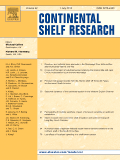
CONTINENTAL SHELF RESEARCH
Innovating Understanding of Marine Resources and ProcessesCONTINENTAL SHELF RESEARCH, published by PERGAMON-ELSEVIER SCIENCE LTD, is an esteemed journal within the fields of Aquatic Science, Geology, and Oceanography, reflecting a compelling intersection of these disciplines. Since its inception in 1982, this journal has served as a premier platform for disseminating cutting-edge research relevant to the continental shelf ecosystem, including its geological features, biological resources, and physical processes. With a Category Quartile ranking of Q1 in Aquatic Science and prominent Q2 standings in Geology and Oceanography, it is recognized for its rigorous peer-review standards and impactful contributions, evidenced by its respective rankings in Scopus. Researchers and professionals are encouraged to engage with the journal's array of high-quality articles that not only enhance scientific understanding but also inform policy and conservation efforts. This dedication to advancing knowledge makes CONTINENTAL SHELF RESEARCH an essential resource for those passionate about marine and coastal studies in the United Kingdom and globally.
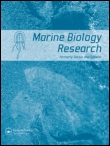
Marine Biology Research
Exploring the depths of aquatic knowledge.Marine Biology Research is a premier journal published by Taylor & Francis, focusing on the dynamic field of marine biology and its intersecting realms of aquatic science, ecology, and oceanography. Since its inception in 2005, this journal has served as a crucial platform for researchers and professionals to disseminate their findings, with a vision extending to 2024 and beyond. The journal is recognized with a Q3 quartile ranking in both Aquatic Science and Ecology, Evolution, Behavior and Systematics, underscoring its growing influence in these fields as evidenced by its Scopus rankings. Located in the United Kingdom, Marine Biology Research aims to foster collaboration and innovation through open access options, facilitating knowledge exchange among the academic community. With a steady commitment to advancing marine sciences, this journal is an invaluable resource for those dedicated to understanding and preserving our ocean ecosystems.
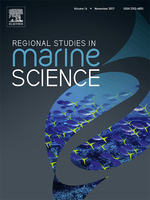
Regional Studies in Marine Science
Navigating the Future of Marine ResearchRegional Studies in Marine Science, published by Elsevier, is a leading academic journal dedicated to advancing the understanding of marine ecosystems and their regional dynamics since its inception in 2015. With an ISSN of 2352-4855, this journal is indexed in Scopus and has achieved impressive ranking quartiles, notably Q2 in categories like Animal Science and Zoology, and Ecology, showcasing its relevance and impact in these fields. As of 2023, it ranks in the 79th percentile for Animal Science and Zoology, reflecting its significant contribution to academic discourse. While the journal operates under a traditional access model, its rigorous peer-review process ensures the publication of high-quality research that is crucial for understanding ecological interactions and fostering sustainable practices within marine environments. Researchers, professionals, and students alike will find this journal an invaluable resource for the latest findings and advancements in marine science, as it strives to bridge the gap between research and practical application at regional and global levels.

Frontiers in Marine Science
Charting Innovative Solutions for Marine ChallengesFrontiers in Marine Science, published by FRONTIERS MEDIA SA, stands as a leading open-access journal dedicated to advancing our understanding of marine ecosystems and their interconnectedness with global environmental systems. With a focus that spans a range of vital sub-disciplines including Aquatic Science, Oceanography, and Ocean Engineering, this journal has achieved prestigious rankings within the Q1 category in multiple areas as of 2023. The journal, thriving since its inception in 2014, promotes high-quality, peer-reviewed research that addresses critical challenges in marine and environmental science, making it an invaluable resource for researchers, professionals, and students alike. Located in Switzerland, Frontiers in Marine Science is committed to accessible scientific knowledge, boasting an impressive impact through a wide array of contributions from the global community. The journal's aim is to foster collaborative research efforts and innovative responses to the pressing issues facing our oceans and waterways today.

MARINE AND FRESHWATER RESEARCH
Diving into the dynamics of ecosystems.Marine and Freshwater Research is a prestigious journal published by CSIRO PUBLISHING that serves as a key platform for the dissemination of cutting-edge research in the fields of Aquatic Science, Ecology, and Oceanography. With an impactful presence since its inception in 1948, the journal provides critical insights into the dynamics of freshwater and marine ecosystems, promoting interdisciplinary approaches that contribute to our understanding of biodiversity and sustainability. Currently ranked in the Q2 category across major scientific domains, including Ecology and Aquatic Science, it enjoys a robust academic reputation supported by impressive Scopus rankings, such as Rank #66/247 in Aquatic Science and Rank #44/145 in Oceanography, reflecting its high citation impact and relevance. While offering a subscription-based access model, the journal remains dedicated to fostering dialogue and innovation within the scientific community, aiming to bridge the gap between research findings and practical applications in environmental management. Located in Australia, Marine and Freshwater Research is an essential resource for researchers, professionals, and students dedicated to exploring the complexities of aquatic ecosystems and advocating for their preservation.
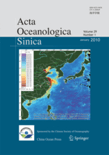
ACTA OCEANOLOGICA SINICA
Illuminating the Complexities of Aquatic EnvironmentsACTA OCEANOLOGICA SINICA, published by SPRINGER, stands as a significant voice in the fields of Aquatic Science and Oceanography, contributing vital research and insights since its inception in 1985. With an ISSN of 0253-505X and an E-ISSN of 1869-1099, this journal maintains a strong international focus, delivering high-quality peer-reviewed articles that address pressing marine and freshwater environmental issues. Although it operates under a subscription model, its Q3 ranking in both Aquatic Science and Oceanography demonstrates its solid standing within Scopus, placing it in the 48th and 44th percentiles respectively. The journal aims to foster knowledge exchange and collaboration among researchers, professionals, and students by providing a platform for innovative studies and comprehensive reviews. With a dedicated editorial board and a commitment to advancing scientific understanding, ACTA OCEANOLOGICA SINICA serves as an essential resource for anyone engaged in the study of oceanographic phenomena and aquatic ecosystems.

Oceans-Switzerland
Exploring the Depths of Oceanic KnowledgeOceans-Switzerland, published by MDPI, is an esteemed open-access journal established in 2020, with a focus on providing a platform for the dissemination of high-quality research in the fields of Environmental Science and Oceanography. Based in the picturesque city of Basel, Switzerland, the journal seeks to foster a deeper understanding of oceanic processes and their implications for the environment through rigorous peer-reviewed articles. With an impact factor reflected in its 2023 Scopus rankings, placing it in the 56th percentile across its categories, Oceans-Switzerland continues to promote interdisciplinary collaboration and innovation, targeting a wide audience of researchers, professionals, and students keen on exploring the complexities of ocean systems. The journal's commitment to open-access policy ensures that groundbreaking research is available to a global audience, reinforcing its crucial role in advancing knowledge and shaping practices within the scientific community.

AFRICAN JOURNAL OF MARINE SCIENCE
Highlighting groundbreaking research in African marine science.AFRICAN JOURNAL OF MARINE SCIENCE is a premier academic journal dedicated to advancing the field of aquatic sciences and ecological studies, published by Taylor & Francis Ltd. Established in 2003 and based in South Africa, this journal provides a vital platform for researchers, professionals, and students interested in the diverse and dynamic marine ecosystems of Africa. With an impressive impact factor reflected in its Q2 quartile ranking in both Aquatic Science and Ecology, Evolution, Behavior and Systematics categories, the journal showcases innovative research that addresses pressing environmental challenges. Open access options facilitate broad dissemination of knowledge, ensuring that cutting-edge findings are accessible to all stakeholders in the marine research community. As it converges towards its impressive milestone year of 2024, the AFRICAN JOURNAL OF MARINE SCIENCE serves as an essential resource for fostering scientific discourse and collaboration across the continent and beyond.

OCEANOLOGY
Bridging Disciplines in Marine ScienceOCEANOLOGY is a distinguished journal published by Pleiades Publishing Inc that has been a pivotal platform for advancing knowledge in the field of oceanography since its inception. With an ISSN of 0001-4370 and E-ISSN 1531-8508, this journal covers a range of topics related to marine sciences, geographical oceanography, and environmental studies, providing insights and research that significantly contribute to our understanding of oceanic systems. Recognized for its academic rigor, OCEANOLOGY holds a Q3 quartile ranking in the Oceanography category as of 2023, reflecting its impact within the scientific community as evidenced by its Scopus rank of 85 out of 145. Although currently not an open-access journal, OCEANOLOGY remains essential for researchers, professionals, and students by offering a comprehensive collection of peer-reviewed articles. This multidisciplinary approach equips its audience with valuable data and perspectives critical for ongoing research and development in ocean-related fields.

Russian Journal of Marine Biology
Connecting Global Research in Aquatic SciencesRussian Journal of Marine Biology, published by MAIK NAUKA/INTERPERIODICA/SPRINGER, serves as a vital platform for disseminating research in the fields of Aquatic Science and Oceanography. With an ISSN of 1063-0740 and E-ISSN 1608-3377, this journal has been in circulation since 1996 and continues to contribute valuable insights across its specified domains. Although it currently holds a Q4 quartile ranking in both fields as of 2023, the journal's impact is underscored by its focused niche in marine biology, attracting contributions from a diverse global research community. Researchers and professionals will find its articles essential for advancing their knowledge and understanding of marine ecosystems and biological processes. While not currently an open access journal, the Russian Journal of Marine Biology remains committed to enhancing the scientific discourse aimed at fostering sustainable marine environments.